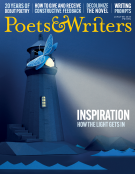Jeffrey Ford, a good friend—and favorite writer—of mine once told me about two workshops he taught at Brookdale Community College, one scheduled in the daytime, one in the evening, and how the evening class became envious of the day class. Here’s what happened, in his own words:
The night class heard the day class got to go to the park next to the college to write one afternoon. The night folks made their own case for an outing, and so I said, “Next week bring a flashlight and your notebook.” We met at night at the edge of the campus and snuck through a hole in the chain-link fence, me and twenty freshmen. It was pitch black. At first we stuck together, a pack of shadows moving through shadows until we broke out from under the canopy and beheld the moon. I warned them not to get caught by the cops or we’d be in trouble. “Okay, Mr. Ford,” they whispered and then scattered. I watched their flashlights beaming like fireflies in every section of the park. When the cops did show up, their headlights the eyes of monsters, we all ran farther in, where the trails were too narrow for a car. We gathered in a clearing in the deep heart of the park, everybody sitting down for a breather, cross-legged on the fallen leaves. The moonlight shone down directly upon us. Then the smartest student in the class, a tall girl with pink braids and a razor wit, opened her notebook and started writing. The rest, one by one, followed suit.
In the same way Ford’s night class envied the day class, I’ve begrudged that long-ago night class their witchy writing experience with him. I love to write with other writers, and I love the moon. I recently published a whole book that’s a love letter to her. I named my bookstore after her. I think about her all the time. And so I wrote to Ford, asking if he would join me writing outside by moonlight. He lives in Ohio, I live in Massachusetts, but why should that be an obstacle? It’s the same night and we would be out in it, writing together. He said of course. I asked another writer friend, Holly Black, if she’d do the same; she asked her family to join in. I asked mine, too. I put out a call on the social media platform Bluesky, letting other writers know they were welcome. Jeff sat on his porch in Ohio; Holly and her family went out into their yard beneath a giant Halloween skeleton; my family and I sat on our patio table beside the chicken coop. Admittedly there was not much moon, and there were some mosquitoes. My kid got fed up with the sound of her parents typing away and went inside to write on a couch. But the air was cool and lovely, there were frogs in the trees, my husband worked on a chapter of his novel, and I wrote a letter to the moon, then worked on a short story. Jeff wrote about his cat. Holly revised her novel. Later, a couple of people on Bluesky let me know how they’d got on.
Since the beginning of the pandemic, I’ve lost access to much of the community I’ve relied on as a writer. My husband has profound long COVID—I don’t want to risk bringing anything back that might further compromise his health. Where once I used to meet up with other writers so we could all work in the same space, now I mostly work by myself. I’m content to be cautious, but I’ve craved that sense of surprise, of acting in a way that feels counterintuitive to common sense. I’ve craved company when I’m in pursuit of the delight and mystery and discovery that writing provides. Another favorite writer of mine, Howard Waldrop, once made a distinction between nighttime logic and daytime logic in fiction. Daytime logic stories are grounded in everyday rules and everyday order, whereas nighttime logic stories are uncanny. They turn our sense of the world upside down. To go out and write a letter to the moon, under the moon, as part of a coven of writers, was to explicitly open up a door to strangeness and possibility and nighttime logic. I’m going to do it again, when the moon is full. Maybe you, too, might wish to welcome strangeness into your writing. Perhaps you might even find a coven of your own. Maybe you, too, might write by the light of the moon.
Kelly Link’s most recent book is the novel The Book of Love (Random House, 2024). Her short stories have been published in the Magazine of Fantasy & Science Fiction, the Best American Short Stories, and Prize Stories: The O. Henry Awards. She was a 2018 MacArthur fellow and has received a grant from the National Endowment for the Arts.
Thumbnail credit: Helen Friel







